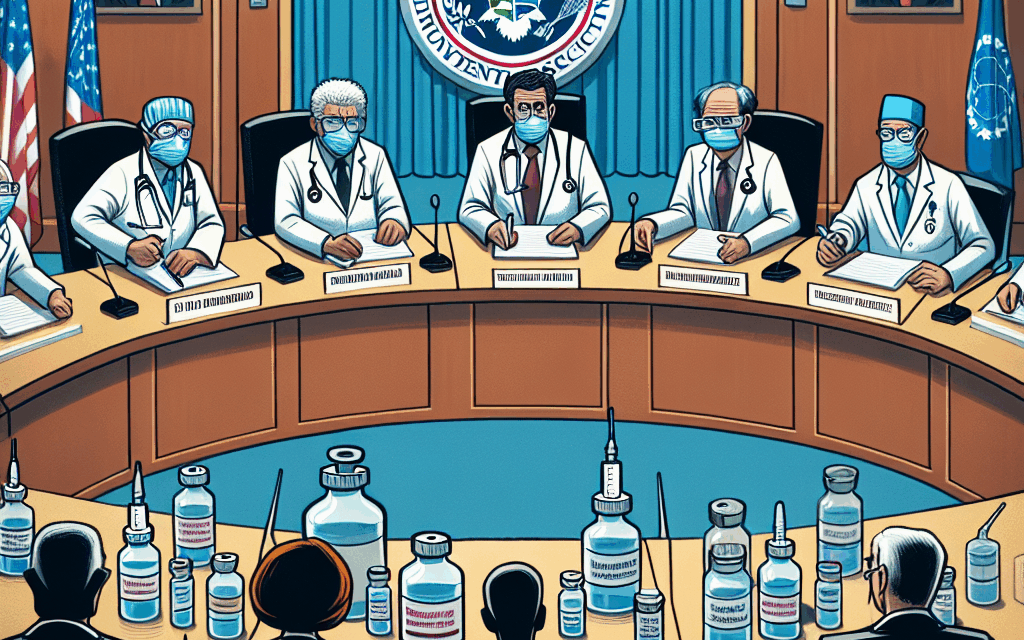RFK Jr.’s Revamped CDC Panel Challenges Vaccine Evidence
In recent years, the debate surrounding vaccines has intensified, with various public figures taking strong stances on the issue. One of the most prominent voices in this discourse is Robert F. Kennedy Jr. (RFK Jr.), an environmental attorney and activist who has long been a critic of vaccines and the pharmaceutical industry. His recent efforts to revamp a panel associated with the Centers for Disease Control and Prevention (CDC) have sparked significant controversy and discussion. This article delves into the implications of RFK Jr.’s actions, the challenges posed to vaccine evidence, and the broader context of vaccine skepticism in America.
The Background of RFK Jr.’s Vaccine Advocacy
Robert F. Kennedy Jr. has been a controversial figure in the vaccine debate for over two decades. His journey into vaccine skepticism began in the early 2000s when he became involved in environmental issues, particularly concerning mercury exposure from vaccines. Kennedy’s claims have often centered around the alleged link between vaccines and autism, a theory that has been widely discredited by scientific research.
Despite the overwhelming consensus in the medical community that vaccines are safe and effective, Kennedy has maintained a significant following. His advocacy is rooted in a broader distrust of pharmaceutical companies and government agencies, which he argues prioritize profit over public health. This skepticism has resonated with many parents who are concerned about vaccine safety, leading to a rise in vaccine hesitancy across the United States.
In 2021, Kennedy founded the Children’s Health Defense (CHD), an organization that promotes vaccine skepticism and advocates for parental rights in medical decisions. The CHD has been instrumental in mobilizing grassroots efforts against vaccine mandates and promoting alternative health practices. Kennedy’s influence has grown, particularly during the COVID-19 pandemic, where vaccine hesitancy became a significant public health challenge.
The Revamped CDC Panel: Objectives and Composition
In 2023, RFK Jr. announced plans to revamp a panel associated with the CDC, aiming to challenge the prevailing narratives surrounding vaccine safety and efficacy. This panel, which Kennedy refers to as the “Vaccine Safety Panel,” is intended to provide a platform for alternative viewpoints on vaccination. The objectives of this panel are multifaceted:
- Promote Alternative Research: The panel aims to highlight studies and data that question the safety and efficacy of vaccines, particularly those that have been overlooked or dismissed by mainstream science.
- Encourage Public Discourse: By creating a space for debate, Kennedy hopes to foster a more open discussion about vaccines, allowing parents and healthcare professionals to voice their concerns.
- Advocate for Parental Rights: The panel seeks to empower parents to make informed decisions about their children’s health without coercion from government mandates.
- Challenge Regulatory Practices: Kennedy’s initiative aims to scrutinize the practices of regulatory bodies like the CDC and the FDA, questioning their transparency and accountability.
- Build a Coalition: The panel is designed to unite various stakeholders, including healthcare professionals, researchers, and parents, who share concerns about vaccine safety.
The composition of the panel has raised eyebrows, as it includes individuals who are known for their controversial views on vaccines. Critics argue that the panel lacks scientific credibility and is more focused on promoting misinformation than fostering genuine scientific inquiry. Supporters, however, believe that it represents a necessary counterbalance to what they perceive as a one-sided narrative in favor of vaccination.
Challenges to Vaccine Evidence: A Critical Examination
One of the most significant aspects of RFK Jr.’s revamped CDC panel is its challenge to the existing body of vaccine evidence. Proponents of vaccines often cite extensive research demonstrating their safety and efficacy, including large-scale studies and meta-analyses. However, Kennedy and his supporters argue that this evidence is flawed or incomplete.
Some of the key challenges posed by Kennedy’s panel include:
- Questioning the Integrity of Studies: Kennedy has frequently criticized studies that support vaccine safety, claiming they are funded by pharmaceutical companies with vested interests. He argues that this creates a conflict of interest that undermines the validity of the research.
- Highlighting Adverse Events: The panel aims to bring attention to reported adverse events following vaccination, suggesting that these incidents are underreported and warrant further investigation.
- Emphasizing Individual Variability: Kennedy’s advocates argue that vaccines may not be safe for everyone, particularly those with specific genetic predispositions or pre-existing health conditions.
- Promoting Alternative Theories: The panel is likely to explore alternative theories regarding vaccine safety, including the role of environmental toxins and the cumulative effects of multiple vaccinations.
- Challenging Herd Immunity Concepts: Kennedy’s group questions the effectiveness of herd immunity, suggesting that it may not be as robust as public health officials claim.
While these challenges have gained traction among vaccine skeptics, they have been met with significant pushback from the scientific community. Numerous studies have consistently shown that vaccines are safe and effective, and the benefits of vaccination far outweigh the risks. The challenge lies in reconciling these differing perspectives and addressing the concerns of hesitant parents without compromising public health.
The Impact of Vaccine Hesitancy on Public Health
The rise of vaccine hesitancy, fueled in part by figures like RFK Jr., has significant implications for public health. As more parents choose to delay or forgo vaccinations for their children, the risk of vaccine-preventable diseases increases. Outbreaks of diseases such as measles, mumps, and whooping cough have been reported in various communities across the United States, often linked to declining vaccination rates.
Several factors contribute to vaccine hesitancy, including:
- Misinformation: The spread of misinformation on social media and other platforms has created confusion and fear surrounding vaccines. Many parents are exposed to anecdotal stories and misleading claims that can sway their decisions.
- Distrust in Government: A growing distrust in government institutions and pharmaceutical companies has led some parents to question the motives behind vaccination campaigns.
- Personal Beliefs: Some individuals hold personal or religious beliefs that oppose vaccination, further complicating the issue.
- Fear of Adverse Effects: Concerns about potential side effects, particularly in light of high-profile cases of vaccine-related injuries, contribute to hesitancy.
- Social Influences: Peer pressure and community beliefs can significantly impact parental decisions regarding vaccination.
The consequences of vaccine hesitancy are profound. Outbreaks of vaccine-preventable diseases can lead to increased morbidity and mortality, strain healthcare resources, and undermine herd immunity. Public health officials are tasked with addressing these challenges through education, outreach, and policy initiatives aimed at increasing vaccination rates.
Strategies for Addressing Vaccine Hesitancy
In light of the challenges posed by vaccine hesitancy, public health officials and healthcare providers must adopt effective strategies to address concerns and promote vaccination. Some key approaches include:
- Education and Communication: Providing clear, evidence-based information about vaccines is crucial. Public health campaigns should focus on dispelling myths and addressing common concerns in a respectful and empathetic manner.
- Engaging Trusted Messengers: Collaborating with community leaders, healthcare professionals, and influencers who are trusted by hesitant parents can help bridge the gap and foster open dialogue.
- Personalized Conversations: Healthcare providers should engage in one-on-one discussions with parents, taking the time to listen to their concerns and provide tailored information that addresses their specific fears.
- Promoting Positive Stories: Sharing success stories of vaccinated individuals and communities can help counteract negative narratives and highlight the benefits of vaccination.
- Policy Initiatives: Implementing policies that encourage vaccination, such as school mandates and access to vaccines in underserved communities, can help increase uptake.
By employing these strategies, public health officials can work to rebuild trust in vaccines and mitigate the impact of vaccine hesitancy on community health.
Conclusion: Navigating the Future of Vaccine Advocacy
The emergence of RFK Jr.’s revamped CDC panel represents a significant moment in the ongoing debate over vaccines. While it has the potential to amplify alternative viewpoints, it also poses challenges to public health efforts aimed at promoting vaccination. As vaccine hesitancy continues to rise, it is essential for public health officials, healthcare providers, and advocates to engage in constructive dialogue and address the concerns of hesitant parents.
Ultimately, the goal should be to foster an environment where informed decisions can be made based on credible evidence and open communication. By understanding the complexities of vaccine hesitancy and addressing the underlying concerns, society can work towards a future where vaccines are embraced as a vital tool for public health.
In summary, the challenges posed by RFK Jr.’s panel and the broader context of vaccine skepticism highlight the need for ongoing education, engagement, and advocacy. As we navigate this complex landscape, it is crucial to prioritize the health and well-being of our communities while respecting individual rights and concerns.





